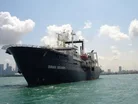New Zealand phosphate sea mining company seeks EPA approval

A company based in New Zealand that plans to mine up to 1.5 million tonnes of phosphate from deep seabed deposits, which was denied the right to mine, looks set to reapply for its mining licence.
The company, Chatham Rock Phosphate, holds a mining licence over an area off the coast of New Zealand with significant seabed deposits of rock phosphate and other potentially valuable minerals.
The Environmental Protection Authority (EPA) refused to give the company consent back in 2015 but in recent news, it has emerged that up to 55,000 tonnes of phosphate have been seized in South Africa – on its way to New Zealand.
55,000 tonnes of phosphate is one eighth of New Zealand’s total annual needs, and the company sees this as definitive proof that the project should go ahead.
The project
Extraction of the rock phosphate would provide a locally produced alternative to the 1 million tonnes of this material annually used in New Zealand and primarily imported from Morocco, thereby reducing our carbon footprint as well as high transport and foreign exchange costs.
The seized phosphate apparently was illegally mined in Morocco, rendering it illegal for export.
Preliminary studies indicate the rock phosphate can be extracted using existing technology for much less than the cost of buying and importing it from Morocco.
Extraction of the resource would be conducted in accordance with the environmental guidelines published by the International Marine Minerals Society “Code for Environmental Management of Marine Mining”.
50,000 leagues under the sea: Deep sea mining and the world of tomorrow
Treasures of the ocean: India to sign contract for exclusive deep sea mining
Deep sea mining: countries in Africa should urge caution, says new report
Tags
deep sea mining- ISA council meet to finalise regulations for deep-sea miningSustainability
- DeepGreen to go public in $2.9bn SPAC dealSustainability
- Allseas acquires ship for deep-sea mining in partnership with DeepGreenSustainability
- DeepGreen launches deep sea exploration vessel with MaerskSustainability



